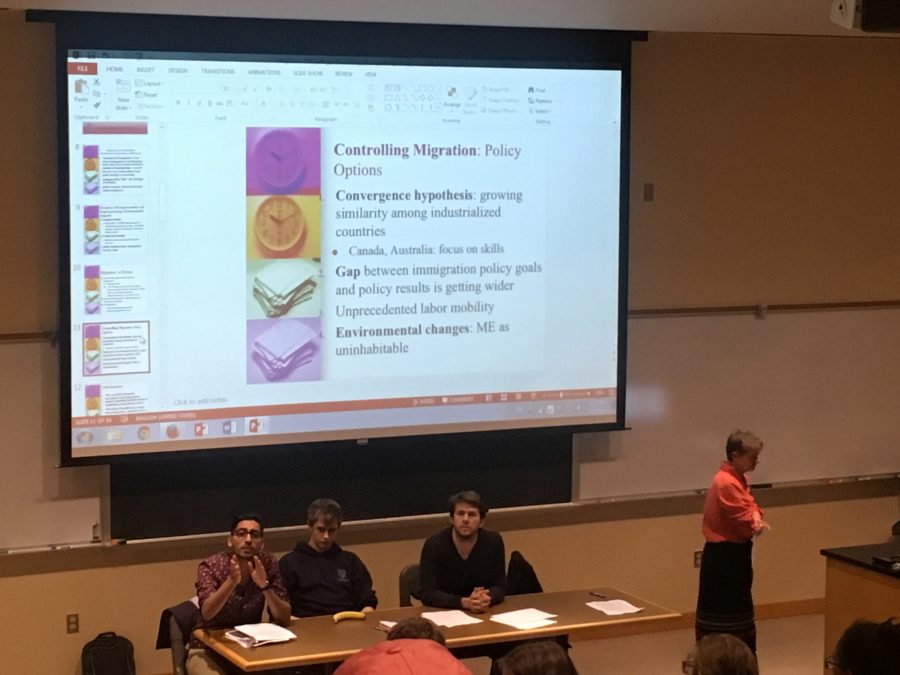
The panel discussion “Is Mass Imigration Bad for Europe?” was meant to frame questions from a conservative viewpoint about the effect of Middle East migrants into Europe. Controversy surrounding the topic brought into question not only its content but the title of the discussion itself.
This was the second talk in the John Stuart Mill Series. Around 25 students attended a nearly two hour-long panel discussion led by government and law professors Brandon Van Dyck and Katalin Fabian, and Abdul Manan Bhat ’18 and Ian Morse ’17.
Fabian gave a presentation at the panel discussion supporting mass immigration into Europe.
Fabian said that we are being “shortsighted” by rejecting young people seeking shelter and asylum and argued that it is good for European countries with aging populations to accept immigrants to have a younger population. Multiculturalism leads to globalization, she said, which is essential to European countries.
Van Dyck then read a letter written by a student who was supposed to be on the panel but could not attend due to a medical issue. Because he could not be there in person to answer questions and defend his points, Van Dyck said the student wished to remain anonymous.
The letter took a stance against mass migration into Europe. In it, the student wrote about issues with the European Union’s open border policy, arguing that it allows immigrants to move throughout Europe unchecked. The student claimed in the letter that Sweden is the rape capital of Europe and cited immigration as the reason. The letter also mentioned Islam for the first time in the talk, though later in the discussion it became a prominent topic. The student claimed that the majority of migrants “do not hold core Western values.”
Several students and one faculty member took issue with the fact that this student was allowed to express his opinion but remain anonymous. Van Dyck said that anyone would be allowed to write a similar anonymous note.
The floor then opened to the students in the audience for comments and questions.
Several of the student arguments were more pro-immigration, but a couple argued against it. Some of the students also took issue with the note from the anonymous student for claiming that Sweden is the rape capital of Europe, asking for evidence.
At the talk, Van Dyck listed scholars from Harvard and Oxford, and cited “millions of Europeans” as people who are against mass immigration into Europe.
Van Dyck said that he does not “take the view that mass immigration is bad for Europe” himself, but that he is a “free speech absolutist.”
He opened the discussion by saying that he invited two professors who expressed discontent at the discussion topic and would not take part in the panel. History professor Rachel Goshgarian and anthropology and sociology professor Neha Vora declined to participate, with Goshgarian taking issue with simplifying a large topic and Vora citing concerns about the title.
“I thought the panel title [which was initially entitled “Is Middle Eastern Immigration Bad for Europe?”] was sensationalistic and played on the kind of rhetoric stoked by the current administration, which encourages emotion-based categorization of foreigners into categories of “good” and “bad,” instead of fact-based learning about the causes of migration and the experiences of migrants themselves,” Vora wrote in an email.
Goshgarian wrote in an email that she said “the framing of the panel was un-intellectual” because “suggesting to our students that after 45 minutes they might be able to make a judgment about whether migration to Europe was good or bad was both disingenuous and, frankly, the opposite of what the liberal arts education offers our students.”
She added that she suggested that Van Dyck organize “a small committee of professors and students to better organize and prepare his series to ensure that qualified members of our campus communities were both engaged in the organization, the preparation, the participation and the attendance,” but Van Dyck did not take her advice.
Another issue Vora had with the talk was that there was no evidence of original research done on the topic. Van Dyck said that he “believed” students were informed enough to have the debate.
Van Dyck said he feels that on college campuses, students and faculty demonize people with opposing viewpoints. He said that students and faculty who disagree with the majority opinion might pay a price socially and professionally.
He added that he felt “no one on campus ever hears from the right” and that this series of talks would give students the ability to hear opinions that challenge the left.
“If college campuses were dominated by people on the right, we would be doing the same thing with left wing perspectives,” he said.